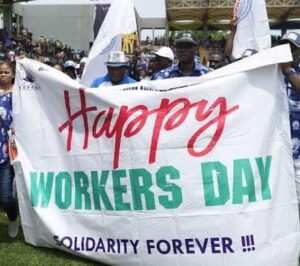
It was a Workers’ Day unlike any other. At the heart of Awka, the newly transformed Alex Ekwueme Square—now a symbol of urban renewal and civic pride—played host to thousands of jubilant workers who gathered not just to celebrate their day, but to also honour a man they now fondly call “Oluatuegwu”—the one who does not fear work.
As the sun glistened on the sprawling grounds, chants of solidarity songs filled the air. But the loudest applause came when organized labour leaders stepped forward to confer on Governor Charles Chukwuma Soludo, the prestigious title of “Workers’ Beacon of Hope.” This recognition was neither hurried nor honorary—it was earned through deliberate actions and verifiable policies that have restored confidence in governance and uplifted the lives of Anambra workers.
The decision to honour Soludo was grounded in a series of worker-centered reforms. At the forefront was his bold and exemplary implementation of the ₦70,000 minimum wage in 2024. While many states hesitated or pleaded economic constraints, Soludo acted promptly. Not only did he approve the new wage, but he ensured its seamless rollout across all sectors without triggering a single day of industrial unrest. According to official figures, the least paid worker in Anambra now earns a gross salary of between ₦78,000 and ₦84,000, with a net take-home pay of no less than ₦70,000. This move not only met the federal standard—it elevated Anambra among the very few states leading in wage reform implementation.
But Soludo’s empathy didn’t stop with the active workforce. Recognizing the growing concerns of retirees, his administration approved a ₦10,000 monthly non-taxable cash award for pensioners as a temporary cushion pending a full review of pension benefits. It was a thoughtful gesture that earned praise from labour veterans who have long felt neglected after years of service.
The mood at the May Day celebration was, therefore, not just festive—it was affirming. Labour leaders took turns recounting how salary payments had remained prompt under Soludo’s watch, how civil service reforms had introduced transparency in payroll systems, and how long-standing issues like gratuity arrears were finally receiving attention. For many workers, this wasn’t just about money—it was about dignity.
Even the venue of the celebration told its own story. Once a dusty, underutilized ground, the Alex Ekwueme Square now stands as a monument to Soludo’s infrastructural drive—proof that governance under the Solution mantra is about results, not rhetoric.
As he rose to accept the award, Soludo’s voice carried both humility and resolve. He thanked the workers for their trust and promised to deepen reforms that place their welfare at the centre of his administration. “This award is a call to do more,” he said. “Our workers are the engine of this state, and we owe them not just salaries but policies that empower and protect them.”
The crowd roared in approval, and for a brief moment, one could sense a rare unity between government and labour—bound by shared purpose, mutual respect, and a leader whose word still means something.
In that spirit, as the crowd dispersed under the banners of #SolutionContinues and #AnambraIsRising, the award of “Workers’ Beacon of Hope” felt less like a title and more like a torch—lit by trust, carried by leadership, and held high by the hands of a grateful workforce.



